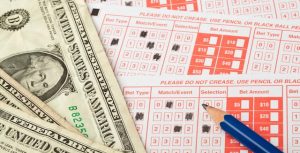Two United States representatives file bill to remove federal sports betting excise tax

Two United States representatives, Dina Titus of Nevada and Guy Reschenthaler of Pennsylvania, have re-filed legislation to repeal the 0.25% federal excise tax on sports betting handle.
This is the fourth consecutive time Titus and Reschenthaler have combined to push for the removal of the tax. They also introduced legislation in 2019, 2021, and 2023. They argue that the tax is outdated and puts legal sportsbooks at a distinct disadvantage to unlicensed operators.
The federal excise tax has been in place since 1951. It requires operators to pay 0.25% on the handle (total amount wagered) plus $50 per employee. It was primarily introduced to tackle widespread illegal gambling operators. However, while it was initially passed to combat illegal gambling, many argue that now it hampers legal sportsbooks and puts them at a disadvantage to illegal operators.
The landscape of sports betting in the United States changed dramatically since the Supreme Court struck down PASPA in 2018, allowing states to authorize sports betting. As of 2025, 38 states have legalized sports betting in some shape or form. In 2024, there was nearly $148 billion wagered at legal sportsbooks, which resulted in total taxes of close to $370 million.
Double penaltyTitus highlighted the issue by pointing out that unlicensed sportsbooks, which do not pay the handle tax, gain an unfair advantage over legal operators who comply with federal and state regulations.
In a joint statement with Reschenthaler said, “Illegal sportsbooks do not pay the 0.25% sports handle tax and the accompanying $50 per head tax on sportsbook employees, giving them an unfair advantage.”
A further issue Titus has raised is that no one knows exactly where the money raised from the excise tax goes. She says, “I once asked the IRS where this money went, and they did not even know.”
Typically, this type of tax is justified only if it helps cover the social costs or negative effects caused by sports betting. However, this tax fails to do so because the revenue is not tracked and thus goes toward general government spending rather than addressing gambling-related harms. Instead, it simply raises the cost of running legal sportsbooks in the 23 states and Washington, D.C., where sports betting is allowed
Hindering economic growthReschenthaler has pointed out that the outdated excise tax hinders legal sports betting companies and limits their growth.
He recently said, “The U.S. gaming industry provides over one million jobs, including over 33,000 jobs in Pennsylvania, and generates more than 70 billion dollars for state and local governments throughout the country.
“Unfortunately, outdated tax codes and burdensome regulations penalize legal operators and incentivize illegal activity. The Discriminatory Gaming Tax Repeal Act of 2025 will ensure the gaming industry can support good-paying jobs and promote economic growth in southwestern Pennsylvania and across the nation. I’m proud to join Gaming Caucus Co-Chair Titus in introducing this bipartisan legislation, and I urge our colleagues in the House to support it.”
Disproportionate impactAnother criticism of the federal excise tax is that it has a unique and non-neutral tax base. State-level taxes on sports betting are usually applied as a percentage of the adjusted revenue, which is the handle minus winnings. However, the excise tax is levied on only the handle.
This effectively makes the rate much higher than 0.25%. A sportsbook’s average hold (revenue) is 5% of the handle, which means that for every $100 wagered, the sportsbook makes $5 in profit. State-level tax rates are then usually applied to that $5 hold. However, the excise tax is on the total handle, which makes it effectively a 5% tax on the hold.
The post Two United States representatives file bill to remove federal sports betting excise tax appeared first on ReadWrite.
